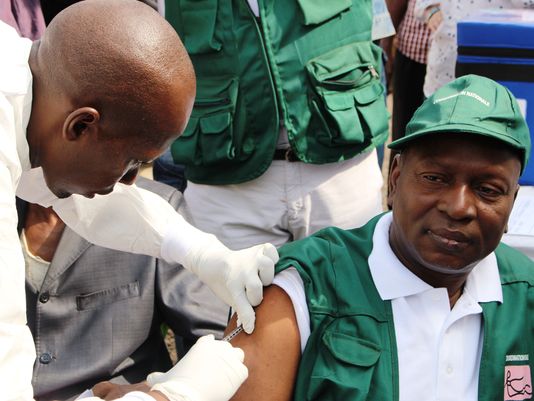You are here
USA TODAY by Liz Szabo April 14, 2015
Sierra Leone has begun testing an experimental Ebola vaccine, officials of the Centers for Disease Control and Prevention announced Tuesday. (Photo: CELLOU BINANI, AFP/Getty Images)
(Photo: CELLOU BINANI, AFP/Getty Images)
The $25 million study, funded through $5.4 billion in Ebola aid authorized by Congress, will test vaccines on 6,000 "front-line workers," including doctors, nurses, burial workers and others, who are at highest risk of the disease.
But with only a handful of new Ebola cases being reported now in Sierra Leone, it may be difficult to get a clear answer on whether the vaccine actually works, the CDC acknowledges. If there are no new cases of Ebola among vaccinated volunteers, for example, researchers won't know if that's the result of the immunizations or because the outbreak has faded....
The vaccine being rolled out in Sierra Leone was developed by the Public Health Agency of Canada and licensed to NewLink Genetics, which has licensed the vaccine to Merck. The vaccine has been tested on 800 people in Africa, Canada, Europe and the USA.
A second Ebola vaccine, developed at the National Institutes of Health and GlaxoSmithKline, is also in clinical trials in West Africa.
Read complete story.
http://www.usatoday.com/story/news/2015/04/14/ebola-vaccine-sierra-leone/25763899/



Comments
Second Ebola vaccine trial may be too little, too late
SCIENCE MAGAZINE by Kai Kupferschmidt April 14, 2015
The second ever real-life test of an Ebola vaccine began Tuesday in Sierra Leone. It is unlikely, however, to achieve its main goal: proving that the vaccine, a livestock pathogen modified with an Ebola surface protein, protects humans against the deadly disease. That’s because there simply may not be enough patients.
Since peaking at the end of November, the number of newly reported cases in Sierra Leone has dropped steadily, from 95 4 weeks ago to just 21 last week. That makes it very unlikely, that the trial—led by the U.S. Centers for Disease Control and Prevention (CDC) and the Sierra Leone Ministry of Health and Sanitation—can get a statistically significant result, says Stephan Becker, a virologist at the University of Marburg, Germany.....
There has been no discussion of scrapping the trial, which may end up costing about $25 million, said Anne Schuchat, director of CDC's National Center for Immunization and Respiratory Diseases at a press conference today. “However, we did decide that it was very important to adjust our design to maximize the chance that we would be able to answer key questions,” she said. Instead of a classic stepped-wedge trial, which introduces a vaccine to different groups in phases and then compares results from those who were vaccinated early with those who were vaccinated later, the investigators are now starting a randomized trial, in which individual participants will receive the vaccine either immediately or after a period of 6 months. The new design increases the time that unvaccinated people—the control group—will be observed.
Read complete article.
http://news.sciencemag.org/africa/2015/04/second-ebola-vaccine-trial-may-be-too-little-too-late